|
February 25, 2022
|

|
| |

|
|
Conference Planner | Social Q&A | Abstracts | Exhibits
|
| |
|
Today's Highlights
Exhibit Hall
7:00 a.m. – 3:00 p.m., Grand Canyon Ballroom 6-8
Day 2 Welcome
7:55 a.m. – 8:00 a.m.
Quynh-Thu Le, MD, FASTRO
Patient Perspective
8:00 a.m. – 8:20 a.m.
Andy Pluemer
Hot Topic: Early Oral Cavity
8:20 a.m. – 9:40 a.m.
Moderator: Mike Moore, MD
Keynote II: Towards Personalization of HPV Related Oropharyngeal Carcinoma
9:40 a.m. – 10:25 a.m.
Nancy Lee, MD, FASTRO
Plenary Session II
10:50 a.m. – 12:20 p.m.
Moderator: Alexander Pearson, MD, PhD
Panel: Thyroid
1:20 p.m. – 2:35 p.m.
Moderator: Sue Yom, MD, PhD, FASTRO
Hot Topic: Options in Advanced Skin Squamous Cell Carcinoma
3:00 p.m. – 4:30 p.m.
Moderator: Robert Ferris, MD, PhD
Development of Survivorship Programs
4:30 p.m. – 5:30 p.m.
Moderator: Jon Irish, MD, MSc
Industry-Expert Theater
5:30 p.m. – 6:30 p.m., Grand Canyon Ballroom 9 & 10
DecisionDx-SCC: Use of a 40-gene expression profile to refine patient metastatic risk in head and neck cutaneous squamous cell carcinoma
|
|
| |
|
Keynote discusses disparities and social determinants of health in head and neck cancer patients
|
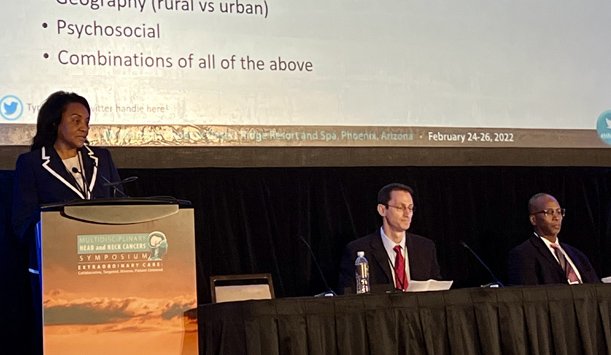
|
|
In the first Keynote session on Thursday, Sharon Spencer, MD, of University of Alabama at Birmingham and Charles Moore, MD, of Emory University spoke about key disparities in head and neck cancer. Dr. Spencer spoke about determinants of health and how disparities of head and neck cancers vary depending on factors like race, gender, environment and more. Dr. Moore looked at some of the social determinants of health and discussed his research in areas where there were notable health disparities, particularly in underserved communities. Both also shared observations about how younger patients were able to identify the relationship between tobacco use and cancer and were more knowledgeable about using telehealth to connect with doctors. The session was moderated by Dan Zandberg, MD, of the University of Pittsburgh Medical Center.
|
|
| |
|
Highlights from the Plenary Sessions
The Symposium’s two Plenary Sessions showcase abstracts deemed to have the highest merit and greatest impact on oncology research and practice. Below, we highlight two studies from Thursday’s K. Kian Ang, MD, PhD, FASTRO, Commemorative Plenary Session I.
|
|
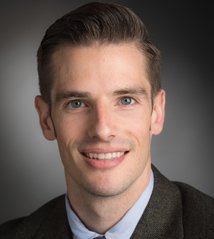 |
Tumor tissue modified viral HPV DNA biomarker test predicts recurrence of HPV-driven oropharynx cancer after treatment
Presenting author: Glenn Hanna, MD
Glenn Hanna, MD, presented his multi-institutional study that demonstrated that a blood test to detect circulating tumor DNA can accurately predict recurrence of HPV-driven oropharyngeal cancer following treatment. Read more.
|
|
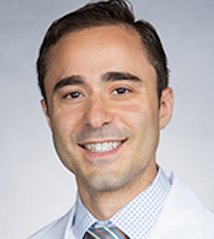 |
Preclinical Study Evaluates Effects of Neoadjuvant Immunoradiotherapy on Anticancer Immunity
By Bhisham Chera, MD, University of North Carolina School of Medicine
Presenting author: Robert Saddawi-Konefka, MD, PhD
Robert Saddawi-Konefka, MD, PhD, presented the results of a preclinical study of neoadjuvant immunoradiotherapy in orthotopic murine oral squamous cell carcinoma models that evaluated how ablation or preservation of the draining lymphatics affected the tumor immune microenvironment. Read more.
|
|
| |
|
Early-career and Trainee Luncheon
|
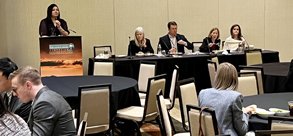
|
Today’s luncheon, Launching Your Successful Career, will feature discussions on publishing your paper, finding personal and professional balance, and seeking out and maintaining mentoring relationships. Hear from Renata Ferrarotto, MD, MD Anderson Cancer Center, Cherie-Ann Nathan, MD, Louisiana State University-Health and Zain Husain, MD, Sunnybrook Health Sciences Centre.
|
|
| |
|
Poster sessions continue today; Virtual Poster Library available to everyone
The Head and Neck Symposium offers more than 100 scientific posters that will feature cutting-edge research relevant to the entire head and neck cancer community. This year, more scheduled poster sessions will allow abstract authors to present their research, discuss the findings and answer questions from attendees.
Friday, February 25
Poster Session III
10:25 a.m. – 10:50 a.m.
Epidemiology and Prevention; Imaging, Physics, Pathology
Poster Session IV
2:35 p.m. – 3:00 p.m.
Immunology and Immunotherapy; Molecular Biology and Therapeutics
You do not have to be a registered attendee of the Symposium to view the posters. Anyone can view posters in the Virtual Poster Library. The library will be available during the symposium and for a limited time after the symposium concludes. Access it on any electronic device or for those in person, at the digital poster viewing stations in the Exhibit Hall. You will need to create an account to view the posters.
|
|
| |
|
ASTRO’s accreditation program growing year over year
ASTRO’s Accreditation Program for Excellence (APEx) is the fastest growing radiation oncology accreditation program in the country. APEx is now recognized in all 50 states. In 2021, APEx saw the highest growth since the beginning of the program. There was an 86% increase in applications and ASTRO issued 234% more determinations than the program’s historic rolling average. In a recent APEx evaluation survey, 97% of practice staff said they were likely or very likely to recommend APEx to a colleague. APEx provides an external review and verifies that the entire radiation oncology team is operating at the highest level.
For head and neck specialist, Gopal Bajaj, MD, MBA, FASTRO, whose facility recently underwent reaccreditation with APEx, the program is flourishing. “In an ever-advancing landscape of radiation therapy delivery, contemporary practices need an accreditation process that facilitates implementing these advances in the safest, most streamlined and highest quality manner.” Dr. Bajaj said. “APEx provides the tools and framework to do this seamlessly.”
Learn more about APEx, including the new options for accreditation and why APEx is The Right ChoiceTM to accredit radiation oncology practices.
|
|
| |
|
Meeting Evaluation and Continuing Education Credits need to be completed by March 29
Don’t forget to provide feedback! The evaluation is available through the ASTRO Academy. To access:
- Log in to the Academy using your astro.org credentials.
- Click on My Activities, then Pending Activities.
- Click the meeting name to take the evaluation and receive continuing education credits.
You must complete the evaluation by March 29. After March 29, the evaluation will no longer be accessible. If you miss the deadline and still want to claim credits and receive a certificate, you will need to contact ASTRO’s eLearning Department and self-attest for your credits. Physicist attendees will not receive certificates of credit from ASTRO. The names of physicist attendees will be sent to CAMPEP 45 days after the meeting.
|
|
| |
|
Follow along with #HNCS22
|
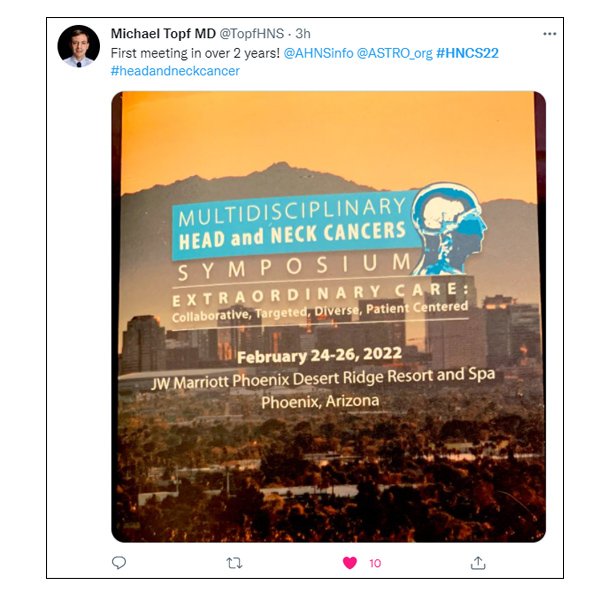
|
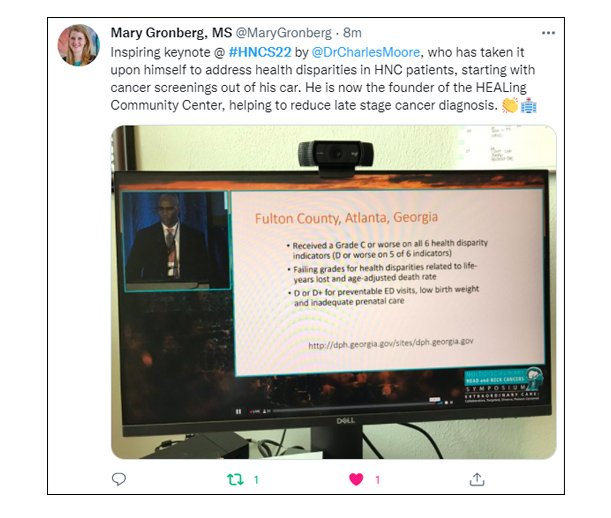
|
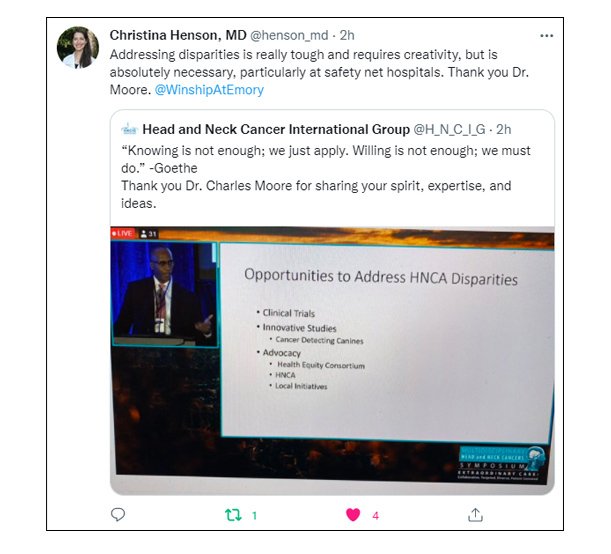
|
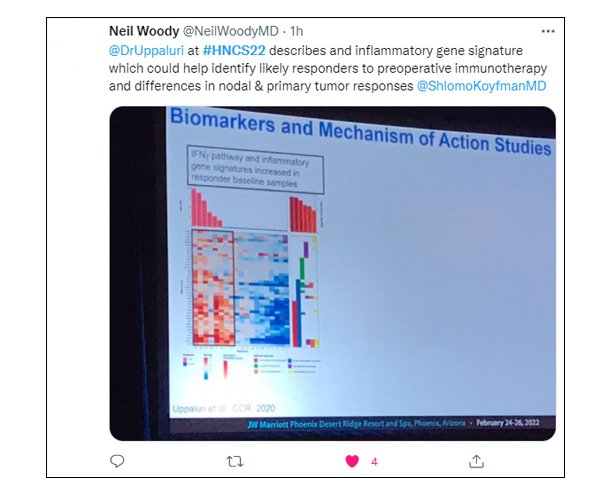
|
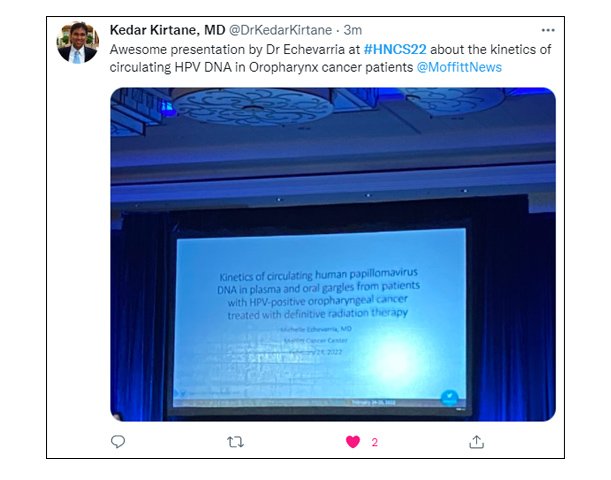
|
|
| |
|
Stay tuned tomorrow for our last Daily News from #HNCS22, including additional coverage of Day 2, more expert commentary on the research from today’s Plenary session and a recap of the Keynote address.
|
|
| |
|
|



